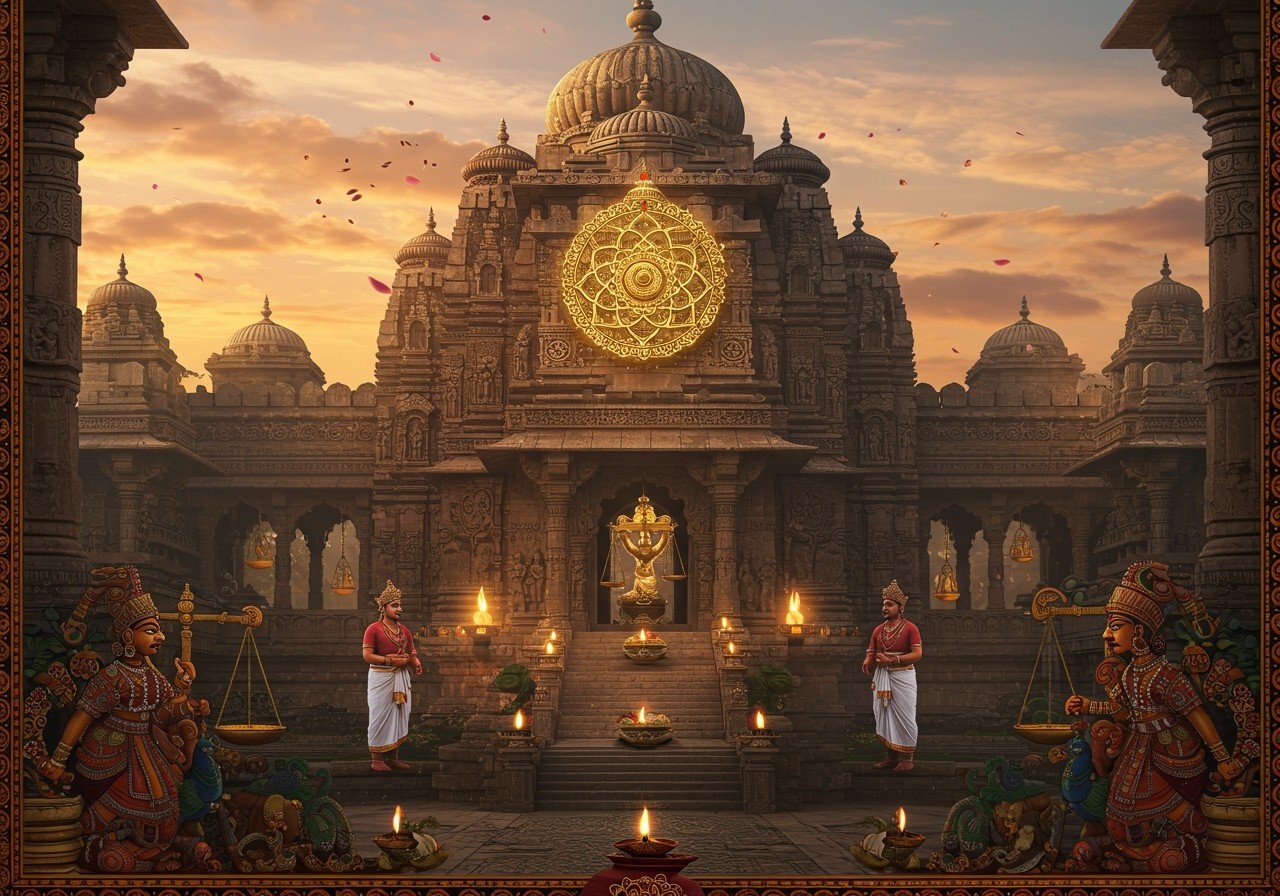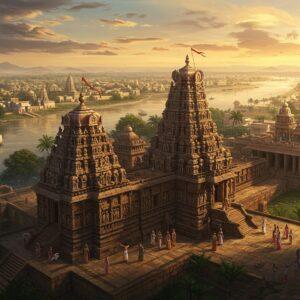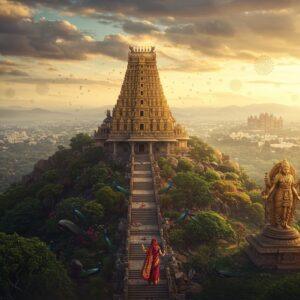
Poojn.in, India’s leading provider of spiritual and cultural goods, invites you to explore the fascinating world of Nyaya Degula, ancient temples in Odisha that served as powerful symbols of justice and righteousness. These sacred spaces offer a glimpse into a time when spirituality and law were intertwined, shaping the cultural landscape of the region.
Discover how these ancient traditions resonate with modern audiences who value cultural heritage and authentic rituals. This exploration delves into the historical, cultural, and symbolic significance of Nyaya Degula, providing valuable insights into Odisha’s rich past.
Nyaya Degula: Where Spirituality Meets Justice
Nyaya Degula stands apart with its distinctive architecture and profound cultural significance. These temples weren’t merely places of worship; they played a central role in administering justice in ancient Odisha. They embodied the principles of law and order, serving as physical manifestations of these essential societal values. The rituals conducted within these sacred walls reinforced their function in maintaining justice. The legacy of Nyaya Degula is still discernible in the legal practices of the region today. Exploring their architecture and iconography reveals profound symbolism related to justice, fairness, and righteousness, highlighting the enduring impact of ancient traditions on contemporary life.
Nyaya Devata: The Divine Embodiment of Justice
The Nyaya Devata, the deity of justice, occupied a prominent position in the spiritual realm of ancient Odisha. This divine figure personified fairness and impartiality, indispensable virtues for upholding law and order. In temple art and sculptures, the Nyaya Devata is often depicted with closed eyes, symbolizing unbiased judgment. This portrayal resonates deeply with the concept of justice being blind, paralleling the Western image of Lady Justice with her scales and blindfold.
The stories and myths surrounding the Nyaya Devata underscore the deity’s crucial role in dispensing justice. These narratives served not merely as entertainment but as moral lessons that shaped societal values and influenced the development of justice systems. Rituals dedicated to the Nyaya Devata often involved offerings that emphasized truth and fairness, further strengthening the community’s commitment to upholding justice. The reverence for the Nyaya Devata permeated Odisha’s cultural values, embedding the principles of justice within the fabric of society. This influence extended to legal systems, where fairness served as a guiding principle. The deity’s presence in literature and folklore further solidified its status as the guardian of justice. Consider enriching your understanding of Odisha’s sacred sites by exploring articles like “Sacred Spaces of Odisha: Temples, Rituals, and Traditions Explained” on poojn.in. Learn more about Odisha’s sacred spaces here.
Deciphering the Closed Eyes of Nyaya Devata
The closed eyes of Nyaya Devata are laden with symbolism. They signify impartial justice, ensuring decisions are rendered without bias or favoritism. This imagery aligns with the philosophical principle that true justice must be objective and equitable. The closed eyes denote a deeper comprehension of justice, prioritizing fairness above partiality.
This depiction echoes the blindfolded Lady Justice in Western traditions, underscoring a universal theme of unbiased law. Scholars and historians have analyzed this iconography, providing diverse interpretations that enrich our understanding of ancient Odisha’s judicial philosophy. Even in contemporary discourse on justice and ethics, the image of Nyaya Devata remains profoundly relevant, serving as a potent reminder of impartiality’s importance in modern legal systems. This symbolic representation continues to inspire contemporary portrayals of justice in art and culture. You might find additional insights on Odisha’s spiritual journey in articles like “Nilamadhav Temple: A Spiritual Journey to the Divine”. Explore the spiritual journey at Nilamadhav Temple.
The Historical and Cultural Tapestry of Nyaya Degula
In ancient times, Odisha’s socio-political landscape played a pivotal role in establishing judicial temples like Nyaya Degula. The integration of religious and legal systems is apparent in the function of temples as centers of governance. Various dynasties and rulers contributed to the evolution of these judicial sites, reflecting their dedication to law and order. For a deeper understanding of Odisha’s historical and spiritual tapestry, consider delving into “Odisha’s Sacred Sites: A Journey through Spirituality and History”. Embark on a journey through Odisha’s sacred sites.
The historical context of Odisha during this era unveils a complex interplay of governance where temples played a central role in administering justice. These structures served not only as sites of religious devotion but also as embodiments of cultural values and priorities. Archaeological findings substantiate the historical function of Nyaya Degula as centers of justice, offering valuable glimpses into the legal systems of ancient Odisha. For those interested in exploring divine feminine and goddess significance, poojn.in offers related articles like “Upper Bagh Devi Temple: Exploring the Divine Feminine and Goddess Significance”.Discover the divine feminine at Upper Bagh Devi Temple.
The Enduring Legacy and Modern Relevance of Nyaya Degula
The legacy of Nyaya Degula continues to shape contemporary Odisha. These enduring symbols of justice inspire current legal practices and cultural traditions. While preservation efforts face challenges, educational initiatives strive to raise awareness about these historical sites. Nyaya Degula holds tremendous potential as tourist attractions, offering opportunities to promote cultural heritage and impart valuable lessons about the history of justice.
The principles of justice upheld by these temples resonate even today, prompting reflection on the importance of cultural symbols. Preserving these ancient traditions ensures that future generations can connect with their rich cultural heritage. Engaging with such profound history enables us to appreciate the enduring influence of ancient traditions on contemporary identities and values.
Poojn.in: Supporting Your Spiritual Journey
Poojn.in offers a wide selection of puja items and religious materials to support your worship and spiritual practices. As India’s largest Dashakarma bhandar, we provide authentic products to enhance your connection with tradition and spirituality.
- Murtis: Discover a divine collection of meticulously crafted murtis, including Adiyogi, Lord Shiva, and Laddoo Gopal.
- Puja Items: Enhance your puja rituals with our range of high-quality items including copper and brass items for abhishekam, traditional diya and deepam sets, high-quality incense and dhoop, fresh flowers and garlands (in select locations), and puja thalis and accessories.
Visit Poojn.in today to explore our complete collection and experience the convenience of online shopping with doorstep delivery across India.
Embracing the Timeless Legacy of Nyaya Degula
Nyaya Degula stands as a testament to the enduring values of justice and cultural heritage in Odisha. Its significance transcends time, weaving ancient ideals into the fabric of modern society. By understanding the role of Nyaya Devata and the symbolism of closed eyes, we gain insights into a judicial philosophy that champions fairness and impartiality. The historical and cultural context of Nyaya Degula reveals a society deeply committed to justice, where temples functioned as both spiritual and judicial centers. This legacy continues to inspire, reminding us of the importance of justice in our lives.
Preserving the legacy of Nyaya Degula is more than preserving historical sites; it is about cherishing the values they represent. By embracing this rich heritage, we honor ancient wisdom and strengthen our cultural identity for generations to come.
Ancient Odisha’s Legal and Administrative Landscape
While direct evidence of ancient Odisha temples serving as formal courts is limited, exploring the administrative and legal aspects surrounding temples offers valuable insights. Historical records, temple inscriptions, and scholarly research shed light on how justice and governance intertwined with religious practices.
Temple Administration: A Blend of Spiritual and Secular Authority
- Royal Patronage: Rulers demonstrated their devotion and authority by actively managing temples, particularly the iconic Shree Jagannath Temple in Puri. This royal oversight ensured the smooth functioning of temple affairs, including rituals, festivals, and the maintenance of temple properties. Royal involvement signified the intertwining of religious and political power.
- Structured Management: Over centuries, sophisticated administrative systems evolved within temples, demonstrating a commitment to efficient organization. The establishment of dedicated service groups, the meticulous record-keeping of rituals and events, and the development of detailed temple manuals all reflect the structured approach to temple management.
Legal Aspects and Temple Properties: Safeguarding Sacred Assets
- Legal Frameworks: The management of temple lands and properties involved legal frameworks and regulations. Ancient texts, royal decrees, and customary practices established guidelines for the proper use and protection of temple assets. These frameworks aimed to ensure the long-term sustainability and sanctity of temple resources.
- Judicial Oversight: While temples may not have served as formal courthouses, disputes related to temple properties, rituals, or personnel often fell under the jurisdiction of religious authorities or royal courts. These judicial interventions ensured that temple affairs were conducted in accordance with established norms and principles.


